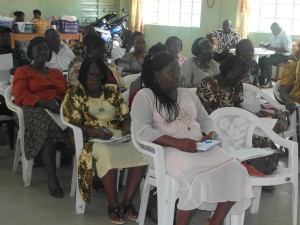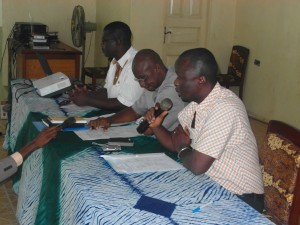NTD Program Refresher Training Makes Sense: The Case of Sierra Leone
November 1st, 2013
For many professionals, education never ends–especially in the healthcare field.
Each year, most allied health professionals have to take part in continuing education in order to maintain their certification or license. This helps them stay abreast of new information and advances in their field, while giving them a chance to reconnect and share experiences with colleagues.
Since having well-trained, knowledgeable staff is critical to the success of NTD control activities, national NTD programs provide continuing education–in the form of periodic refresher training–to key program staff, with support from END in Africa.
Such training is generally a great way to quickly update district NTD focal points on new preventive treatment strategies and guidelines for specific diseases and new tools for monitoring and evaluating NTD prevalence. Since NTD programs tend to have high turnover, the training also gives new staff a chance to get a handle on the most critical job skills, and to get quick answers to any questions, doubts or concerns.
Timing is important when scheduling such training; most NTD programs schedule training sessions shortly before the start of mass drug administration (MDA) campaigns, so that staff are up to date on MDA best practices from day one.
Sierra Leone takes NTD training to a higher level
Some countries are even taking advantage of refresher training to implement innovative approaches aimed at improving program efficiency and effectiveness, as well as lowering costs. Sierra Leone’s national NTD program is leading the way in this regard.

Maternal & Child Health Aide Training Coordinators at NTD Training in Bo, Sierra Leone. Photo: J. Koroma, FHI360
On August 15, 2013, the country hosted a one-day refresher training for program trainers in the southern district of Bo. The training was timed to precede the MDA campaigns for lymphatic filariasis, onchocerciasis and soil-transmitted helminthes, taking place between September and December 2013, in all 14 of the country’s health districts (HDs).
In the past, refresher trainings for trainers used to take up to 5 days. However, the national NTD program and Helen Keller International, END in Africa’s program sub-grantee in Sierra Leone, used feedback from the program’s field supervisors to identify topics where field staff most needed guidance. This allowed them to develop a well-focused, albeit intense, one-day training agenda that provides trainers with skills to strengthen previously weak program areas. Shortening the training to a single day has been instrumental in reducing the program’s training costs.
Interestingly enough, these cost reductions have not come at the expense of quality; on the contrary, the shorter duration and sharper focus of the training have actually improved its quality! How? By letting district NTD focal points take the lead in serving as facilitators during the discussions, and encouraging national-level NTD program staff to provide support only as needed. This approach created an optimal climate for district NTD focal points to share experiences, enabling them to learn from each other and enlighten other key players about local challenges, at the same time.
In addition, selecting Bo (rather than the capital city of Freetown) as the venue contributed to the effectiveness of the training, as well. Bringing district staff to Freetown tempts people to take advantage of their time in the capital to address administrative problems with their colleagues at the Ministry of Health headquarters, diverting their attention from the training. Steering clear of Freetown helped the participants stay focused on the training by removing potential distractions.
Selecting participants more carefully also contributed to higher quality training. Rather than continuing to train District Medical Officers (DMOs), who are not directly involved in the program, the national NTD program limited the training to just those working directly on NTD control. Instead for the first time, it invited maternal and child health (MCH) aide training coordinators and district school health focal points for urban and school-based MDA campaigns (respectively), to attend the training.
Training these groups is important for ensuring that optimal MDA treatments are provided in schools and urban areas in each district. Since the national NTD program now uses MCH Aides to deliver treatments in urban areas, including MCH aide training coordinators in the training gives them the basic knowledge of NTDs they need to adequately train MCH aides in advance of urban MDAs for LF, schistosomiasis and soil transmitted helminthes. Likewise, the training helps district school health focal points support the district NTD focal points by delivering mass treatments in schools for schistosomiasis and soil transmitted helminthes. Engaging such professionals in NTD program trainings also provides an opportunity to explore potential synergies and collaboration among the NTD, MCH and school health programs.
Since it’s hard to get so many key NTD national and district program staff together at once, the national NTD program staff took advantage of the opportunity to schedule and plan a variety of future training activities, including training for peripheral health unit (PHU) staff, community meetings, and training for community drug distributors (CDDs) and MDA campaigns. Participants agreed on activity timeframes and deadlines for submitting reports, which is very important since under new USAID policies for fixed obligation grants, reports for completed activities must be submitted before the national and district NTD programs can receive funding.
Sierra Leone is a great example for other national NTD programs, showing that with innovation and careful planning, it’s possible to scale down training costs and simultaneously improve training quality while continuing progress toward decreasing NTD prevalence in its health districts. It also provides some good insight on how to make good use of the funding provided for refresher training to train new staff, update NTD program staff on new treatment strategies and developments in the global NTD program, and address very pertinent program issues.


